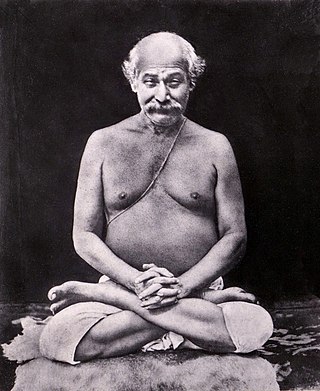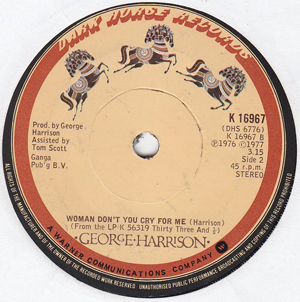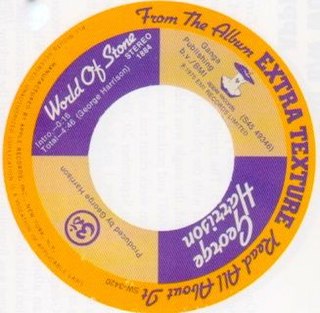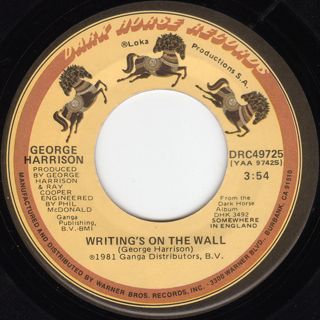Related Research Articles

Paramahansa Yogananda was an Indian-American Hindu monk, yogi and guru who introduced millions to meditation and Kriya Yoga through his organization, Self-Realization Fellowship (SRF) / Yogoda Satsanga Society (YSS) of India – the only one he created to disseminate his teachings. A chief disciple of the yoga guru Swami Sri Yukteswar Giri, he was sent by his lineage to spread the teachings of yoga to the West. He immigrated to America at the age of 27 to prove the unity between Eastern and Western religions and to preach a balance between Western material growth and Indian spirituality. His long-standing influence in the American yoga movement, and especially the yoga culture of Los Angeles, led him to be considered by yoga experts as the "Father of Yoga in the West". He lived his last 32 years in America.

Sri Yukteswar Giri is the monastic name of Priya Nath Karar, an Indian monk and yogi, and the guru of Paramahansa Yogananda and Swami Satyananda Giri. Born in Serampore, West Bengal, Sri Yukteswar was a Kriya yogi, a Jyotisha, a scholar of the Bhagavad Gita and the Upanishads, an educator, author, and astronomer. He was a disciple of Lahiri Mahasaya of Varanasi and a member of the Giri branch of the Swami order. As a guru, he had two ashrams, one in Serampore and another in Puri, Odisha, between which he alternated his residence throughout the year as he trained disciples.

Shyama Charan Lahiri, best known as Lahiri Mahasaya, was an Indian yogi and guru who founded the Kriya Yoga school. He was a disciple of Mahavatar Babaji. According to the book America's Alternative Religions by Timothy Miller, Lahiri Mahasaya's life was described in Paramahansa Yogananda's Autobiography of a Yogi as a demonstration of the spiritual attainment that could be achieved by a householder "living fully in the world". A part of Lahiri Mahasaya's face is pictured on the cover of The Beatles' 1967 album Sgt. Pepper's Lonely Hearts Club Band.

Self-Realization Fellowship (SRF) is a worldwide religious organization founded in 1920 by Paramahansa Yogananda, the Indian guru who authored Autobiography of a Yogi. Before coming to the United States, Yogananda began his spiritual work in India in 1917 and named it Yogoda Satsanga Society of India (YSS). He came to the West in 1920 and in 1925 established SRF's headquarters at Mount Washington, Los Angeles, California. Before his return visit to India in 1935, he legally incorporated SRF in the United States, designating it as the only organization to carry on his work – to care for and disseminate his teachings.

Mahavatar Babaji is the Himalayan yogi and guru who taught Kriya Yoga to Lahiri Mahasaya (1828–1895). Babaji first became recognized through the writings of Paramahansa Yogananda, who devoted a chapter of his Autobiography of a Yogi to Babaji and founded Self-Realization Fellowship, a modern yoga movement that Babaji is associated with. The cave near Ranikhet where Babaji met Lahiri Mahasaya is now a tourist attraction and place of pilgrimage in India.

Kriya Yoga is a yoga system which consists of a number of levels of pranayama, mantra, and mudra, intended to rapidly accelerate spiritual development and engender a profound state of tranquility and God-communion. It is described by its practitioners as an ancient yoga system revived in modern times by Lahiri Mahasaya, who claimed to be initiated by a guru, Mahavatar Babaji, circa 1861 in the Himalayas. Kriya Yoga was brought to international awareness by Paramahansa Yogananda's book Autobiography of a Yogi and through Yogananda's introductions of the practice to the West from 1920.

Thirty Three & 1⁄3 is the seventh studio album by English musician George Harrison, released in November 1976. It was Harrison's first album release on his Dark Horse record label, the worldwide distribution for which changed from A&M Records to Warner Bros. as a result of his late delivery of the album's master tapes. Among other misfortunes affecting its creation, Harrison suffered hepatitis midway through recording, and the copyright infringement suit regarding his 1970–71 hit song "My Sweet Lord" was decided in favour of the plaintiff, Bright Tunes Music. The album contains the US top 30 singles "This Song" – Harrison's satire on that lawsuit and the notion of plagiarism in pop music – and "Crackerbox Palace". Despite the problems associated with the album, many music critics recognised Thirty Three & 1⁄3 as a return to form for Harrison after his poorly received work during 1974–75, and considered it his strongest collection of songs since 1970's acclaimed All Things Must Pass.

Autobiography of a Yogi is an autobiography of Paramahansa Yogananda published in 1946.

"Woman Don't You Cry For Me" is a song by English musician George Harrison, released as the opening track of his 1976 album Thirty Three & 1/3.

"Crackerbox Palace" is the ninth track on George Harrison's 1976 album, Thirty Three & 1/3. The song was released as the second single from the album and reached number 19 in the American pop charts.

"World of Stone" is a song by English rock musician George Harrison, released in 1975 on Extra Texture , his final album for Apple Records. It was also issued as the B-side of the album's lead single, "You". Harrison wrote the song in 1973 but recorded it two years later, following the unfavourable critical reception afforded his 1974 North American tour with Ravi Shankar and the Dark Horse album. Due to its context on release, commentators view "World of Stone" as a plea from Harrison for tolerance from these detractors. According to some of his biographers, the lyrics reflect Harrison's doubts regarding his devotion to a spiritual path – an apparent crisis of faith that followed his often-unwelcome spiritual pronouncements during the tour, and which permeated his work throughout 1975.

World Brotherhood Colonies are an idea for self-sustaining spiritual communities envisioned by Paramahansa Yogananda, the Indian yogi who authored Autobiography of a Yogi and founded Self-Realization Fellowship / Yogoda Satsanga Society of India. Yogananda envisioned that communities for "plain living and high thinking," would develop as a natural culmination of the spread of his teachings.
"Beautiful Girl" is a song by English musician George Harrison, released on his 1976 album Thirty Three & 1/3. Harrison began writing the song in 1969 and considered recording it for his 1970 triple album All Things Must Pass. In its finished, 1976 form, the lyrics of "Beautiful Girl" were inspired by Harrison's second wife, Olivia Arias.
"See Yourself" is a song by English musician George Harrison, released on his 1976 album Thirty Three & 1/3. Harrison began writing the song in 1967, while he was a member of the Beatles, in response to the public outcry surrounding bandmate Paul McCartney's admission that he had taken the hallucinogenic drug LSD. McCartney's announcement created a reaction in the press similar to that caused in 1966 by John Lennon's statement that the Beatles were more popular than Christianity. In its finished form, the song's lyrics advocate self-awareness and consideration for the consequences of one's actions. Musically, the composition contains unusual shifts in time signature from standard 4/4 to 9/8, while the songwords reflect the era of its genesis by recalling themes first espoused in the Beatles tracks "Within You Without You" and "All You Need Is Love".

"Writing's on the Wall" is a song by English musician George Harrison from his 1981 album Somewhere in England. It was also the B-side of the album's lead single, "All Those Years Ago", which Harrison wrote as a tribute to his former Beatles bandmate John Lennon. In his lyrics, Harrison sings of the transient nature of life and the importance of recognising a spiritual purpose. Although the song was written long before Lennon's murder in New York in December 1980, the lyrics' reference to how easily friends can be shot down and killed led listeners to interpret it as a further comment on Lennon's death.

Awake: The Life of Yogananda is a 2014 documentary about the Indian yogi and guru Paramahansa Yogananda who came to the West in the 1920s to teach yoga and meditation. The film is in English with subtitles in seventeen languages.

The Light of Smiles is the fourth album by American rock musician Gary Wright. It was released in January 1977 on Warner Bros. Records as the follow-up to his commercial breakthrough, The Dream Weaver. The album was produced by Wright and recorded in Los Angeles in 1976. Aside from drums and orchestral strings, the music was created entirely on synthesizers and other keyboard instruments. The lyrics reflect Wright's preoccupation with spirituality, particularly the teachings of Indian yogi Paramahansa Yogananda.
This is a bibliography of the works of Paramahansa Yogananda, published by his worldwide spiritual organization Self-Realization Fellowship/Yogoda Satsanga Society of India. He began his spiritual work in India in 1917 and named it Yogoda Satsanga Society of India. When he came to the United States in 1920, he founded Self-Realization Fellowship. Today the international headquarters of Self-Realization Fellowship/Yogoda Satsanga Society of India is in Los Angeles, California.
References
- 1 2 3 Thirty Three & 1/3 (CD booklet). George Harrison. Dark Horse Records. 2004. p. 2.
{{cite AV media notes}}: CS1 maint: others in cite AV media (notes) (link) - ↑ Thirty Three & 1/3 (CD booklet). George Harrison. Dark Horse Records. 2004. p. 9.
{{cite AV media notes}}: CS1 maint: others in cite AV media (notes) (link) - ↑ Gary Tillery, Working Class Mystic: A Spiritual Biography of George Harrison, Quest Books (Wheaton, IL, 2011; ISBN 978-0-8356-0900-5), p. 56.
- ↑ Peter Doggett, You Never Give Me Your Money: The Beatles After the Breakup, It Books (New York, NY, 2011; ISBN 978-0-06-177418-8), p. 22.
- ↑ Chip Madinger & Mark Easter, Eight Arms to Hold You: The Solo Beatles Compendium, 44.1 Productions (Chesterfield, MO, 2000; ISBN 0-615-11724-4), p. 454.
- ↑ Ian Inglis, The Words and Music of George Harrison, Praeger (Santa Barbara, CA, 2010; ISBN 978-0-313-37532-3), pp. 60, 62.
- ↑ "Harrison, George – Thirty-Three & 1/3: Encyclopedia of Popular Music", oxfordindex.oup.com (retrieved 8 March 2015).